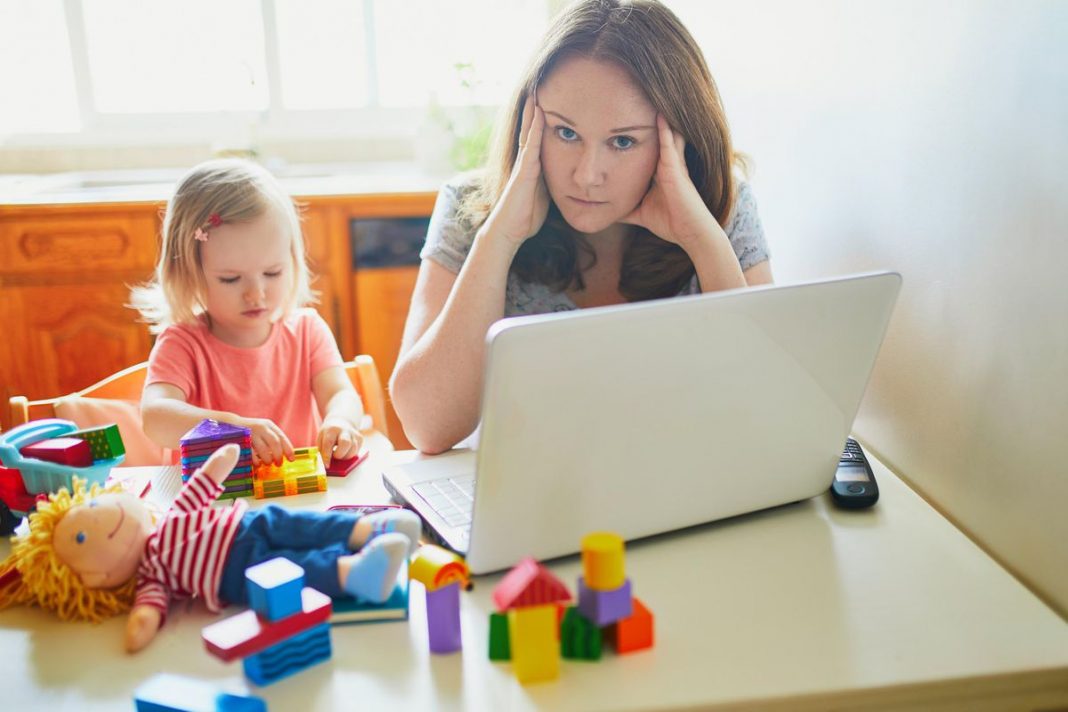
When schools and daycares closed in the U.S. during the Covid-19 pandemic, mothers were forced out … [+]
getty
Parents cannot go to work if they don’t have childcare for their kids. This fundamental economic reality has come into glaring relief during the past year. The Covid-19 pandemic has only exacerbated the struggle families, and particularly working mothers, face to find safe and reliable care for their children so that they can go to work.
Now, a new study looks at how three western nations handled the childcare crisis that coronavirus has created. As study author Caitlyn Collins has found before in her research, the U.S. is once again in last place when it comes to supporting working families. This time, that lack of support has widened the gender gap in the workforce.
For the study, Collins and her co-author Nino Bariola examined policies in Denmark, Germany, and the United States. These three countries took different approaches because they represent distinct welfare regimes. Their study revealed variation not only between the countries’ policy solutions, but also in the “cultural infrastructures” the support those policies, or don’t.
Denmark
“Denmark’s lockdown measures followed its equality-minded spirit,” says Collins. “Reopening daycares and elementary schools was a priority—they opened doors only after a month of lockdown.” Denmark’s government also provided a large economic rescue package to prevent layoffs.
Denmark is what scholars refer to as a social democratic state, similar to Sweden or Norway. Collins explains that such regimes assume full responsibility for their citizens’ wellbeing. “They offer generous policies to support ALL citizens and seek to promote equality,” says Collins. And Denmark assumes a dual-earner family model.
Germany
In Germany, a conservative or corporatist state like France or Austria, existing programs were expanded to help workers during the pandemic. “It’s a system where there is market primacy, but the state and employers intervene to support citizens,” Collins explains. “Benefits are generally contingent on employment or family position.”
When considering family position, gender comes into play. According to Collins, Germany’s family model has historically upheld a man breadwinner/woman caregiver (or part-time earner) model. Even though things are changing, cultural legacies like these influenced how Germany handled the pandemic when it came to women and children.
“Kids remained at home from school for a prolonged period, which pushed many women out of their jobs,” says Collins. “The central government didn’t deem it a priority to reopen schools for kids of young age.” Even worse for women, Germany’s main social insurance program (Kurzarbeit) did not apply to many occupations that referred to as ‘mini jobs’ and are considered women’s work.
The U.S.
“The U.S. is notoriously a case in which social problems are privatized,” says Collins. As what scholars designate a ‘liberal regime,’ America looks to the market to provide solutions when citizens have needs to meet. “The state intervenes little and in a very targeted fashion,” Collins explains, “And employers are the ones who have to offer assistance without much ‘interference’ from the government.”
And even though 70% of families with children exist as dual-earner households, the woman-caregiver model still dominates in the U.S. So when schools and daycares remained closed until late September or October 2020, it was predominantly working mothers who left their jobs to stay home with the kids.
“The pandemic affected women’s jobs the most,” says Collins, “And the fact that unemployment benefits were a bureaucratic mess also implied gendered effects.” For instance, Collins believes that prejudices and social stigma kept many people from taking advantage of paid-leave programs during the pandemic. When people did use paid-leave, these programs provided very limited assistance (2 weeks) as compared to those common in other welfare regimes.
Collins notes that some private companies like Google, Facebook and Microsoft offered some assistance to their workers, but this was typically only available only to high-earners.
Overall, Collins’ concern is the way the unprecedented event of the Covid-19 pandemic revealed the relative weaknesses of the different regimes. “Patchwork efforts at lockdown and reopening have meant a lengthy period of limbo for working families, with disastrous consequences for women, especially the most vulnerable. Among such varied ‘solutions’ to the consequences of the pandemic, those of liberal regimes seem to be worsening inequalities.” she writes in the study.
However, Collins wants to point out that the U.S. has proposed some new measures in the last few months that may help to mitigate the situation for mothers in the workforce. She highlights policies like the children’s tax credit and new proposals pertaining to family paid leave as essential to creating the conditions for more gender equality.




